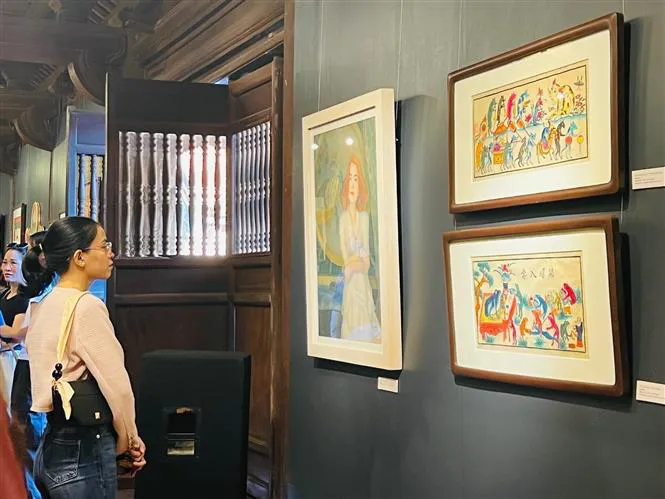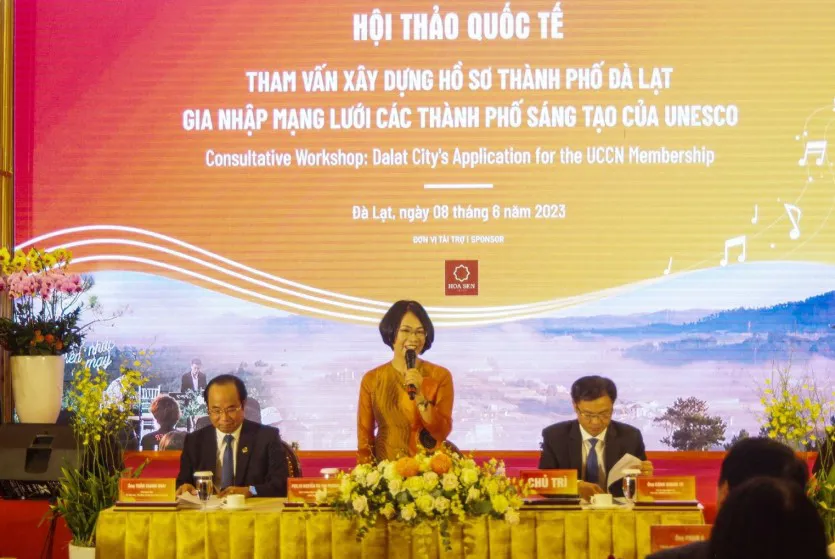Cultural industry development needs more policies
The cultural industry needs to be developed while balancing economic interests and culture; this will ensure that human and cultural considerations are included in economic development.
To make Vietnam's cultural industry one of the country's economic pillars, experts believe it is critical to refine policies and make appropriate investments to foster the development of Vietnam's cultural industry.
Since there hasn't been enough investment, Associate Professor, PhD Nguyen Thi Thu Phuong, Director of the Vietnam Institute of Culture and Arts Studies, stated that Vietnam’s raw "materials" haven't yet been processed into top-notch cultural goods. She discussed the overall state of the national cultural industry with The Hanoi Times and offered some remedies.
| People enjoy artworks developed and inspired by Hang Trong folk paintings. Photo: VNA |
Obstacles remain
What role does the cultural industry play in achieving the national goal of development, in your opinion?
Before 2016, the cultural industry was a strange concept in Vietnam. Our survey's findings in 2018 indicate that television, radio, and film are the most popular cultural industries, followed by advertising; architecture; cultural tourism; performing arts; fine arts, photography and exhibitions; crafts; publishing ; design; fashion.
From 2016 to the present, policies related to Vietnam's cultural industry have generally been formulated based on the perception that culture is a market economy with products and services. More thought has been given to the cultural needs of Vietnamese people and to promoting the role of civil society in supporting creativity and protecting the rights of artists.
Vietnam has steadily restructured the economy towards a knowledge-based economy through favorable institutional changes, transforming cultural resources into commodities and raw materials for the cultural industry.
The development of the cultural industry has been the focus of numerous national and international conferences. Consultations with UNESCO, the British Council, the Goethe Institute, and embassies have helped Vietnam better understand cultural industry development in social life.
What positive changes do you see in cultural industries regarding socio-economic development contribution?
It can be argued that with its recent growth, the cultural industry is being recognized as an economic sector with increasing competitiveness in both domestic and foreign markets, which shows how successfully Vietnam's cultural industry is harnessing its resources through its operations and gradually closing the gap in competitiveness with its peers around the world.
| Associate Professor Nguyen Thi Thu Phuong is an expert in developing cultural industries. Photo: VICAS |
Vietnam has much potential for developing cultural industry because of its large population, rich culture, and integration into modern society. The Government is also making strong efforts to support the development of the cultural industry. So why hasn’t this industry fully grasped the strengths of its rich cultural resources?
Vietnamese people still prefer foreign goods to domestic ones because the latter lacks the uniqueness, applicability, and vivid expression of cultural identity. Therefore, the "made in Vietnam" cultural items have not satisfied the nation's growing need for cultural enjoyment and consumption. As a result, the domestic cultural market is being invaded by cultural industrial products from Korea, Japan and China.
Vietnam can tap into its rich infrastructure and 198 creative spaces nationwide to transform its cultural industries into soft power. However, these creative cultural spaces have not worked effectively. On the other hand, the lack of consideration of the cultural industry as a field that closely combines creativity, technology and copyright has made this resource unattractive to foreigners.
Harmonious development between economy and culture
What needs to be done for Vietnam to make a breakthrough in this sector?
The cultural industry needs to be developed while balancing economic interests and culture; this will ensure that human and cultural considerations are included in economic development and the sector's ability to adapt to the Fourth Industrial Revolution and contemporary technologies.
To expand the markets and tap into cultural resources, Government agencies should actively collaborate, foster commerce, and promote Vietnam's cultural industrial products worldwide.
| Ho Guom Opera, a new cultural institution of Hanoi. Photo: The Hanoi Times |
Can you provide specific solutions to achieve the above goal?
The State needs to refine the institutional and policy framework, promptly remove bottlenecks, form a legal and institutional framework to harness all potentials and resources, and create a driving force for the cultural industry to develop, meeting market requirements.
Second, the cultural market must be improved, with priority given to the development of a number of cultural industries. The State should provide a preferential mechanism, simplify administrative procedures, and create a favorable business and investment environment for enterprises to invest in cultural industries.
On the other hand, emphasis should be placed on the development of cultural industries with potential and advantages, such as cinema, performing arts, fine arts, photography, exhibitions, and cultural tourism; the development of contemporary art forms should be fostered, gradually improving the competitiveness of cultural industries.
The third step is to modernize the financial investment mechanism in the cultural industry. Creating creative spaces or environments is another key answer today. Developing talents (artists, intellectuals) is also a critical solution for the development of cultural business.
The fourth solution consists in investing in the development of the infrastructure of the cultural sector.
Finally, it is necessary to strengthen the link between tradition and modernity in the design, production, and distribution of cultural industrial products and services.
Thank you for your time.



.jpg)










